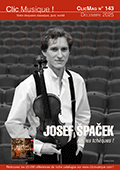|
L’œuvre de Mauro Giuliani, comme celle de ses proches, mérite certainement la redécouverte qu’elle connait depuis le dernier quart du 20e siècle. En effet, son étendue relative, mais surtout sa qualité et son originalité légitiment assurément ce regain d’intérêt des musicologues et des interprètes. Malheureusement, il ne faudra aucunement compter sur le présent enregistrement pour conforter cette perspective. L’acidité de la voix de Dominika Zamara, son absence de contrôle vocal comme d’évidents problèmes de justesse constituent en l’espèce des défauts absolument rédhibitoires. (Alain Monnier)  In 1806, when he moved to Vienna with his family, Mauro Giuliani found in the Habsburg capital an environment ready to appreciate his talent, which at home had not managed to make inroads as he deserved. As soon as he arrived in Vienna, Giuliani managed to fit into many aristocratic salons, where he stood out thanks to a brilliant technique and an intense melodic vein, which the Viennese public proved to really appreciate. In the ten years of his stay in Vienna, Giuliani got to know many of the most important composers of the time, including Beethoven, who, according to some witnesses of the time, was happy to listen to his concerts. In this way, Giuliani was able to make the guitar tradition grow in Vienna, which after him would find numerous highly talented performers, including Johann Kaspar Mertz. Unfortunately, the artistic success was accompanied by serious personal problems, which at the end of 1819 led the composer to return to Italy, where his concert activity dramatically dropped, aggravating his precarious economic situation. The desire to return to Vienna thus crept into Giuliani’s heart, and in a letter of 1828 he confirmed to the publisher Artaria his imminent arrival in the city, a project which, however, his health conditions prevented him, blocking him in Naples, where he died at the age of 47 on May 8, 1829. Among Giuliani’s vocal works, the six Cavatine op. 39 and the Ariette op. 95, based on a text by Pietro Metastasio; it should be emphasized that on the title page of both the words “with piano-forte or guitar accompaniment” appear, which reveals the intention to arouse the interest of the widest possible audience. As can be understood from the same title, the Cavatine op. 39 have their roots in the vocal tradition that belonged to Rossini, looking however already at Bellini’s bel canto styles, with the addition of some Donizetti echoes. Compared to Arcadian cantatas, Giuliani’s little gems decline the sentiment of love in a less abstract atmosphere, in which fleeting cues of greater emotional intensity are inserted, which contribute to conferring a tone of vivid realism. The more ambitious Ariette op. 95, which Giuliani dedicated to Maria Luigia of Austria, Duchess of Parma, Piacenza and Guastalla. For this refined patron of the arts, Giuliani wrote six highly elaborate pieces of writing, capable of expressing Metastasio’s clear poetic images. From a stylistic point of view, in these works we can perceive an evident influence of the Italian operas such as Giovanni Paisiello and Giovanni Battista Pergolesi, as can be seen, for example, in the caressing melody of Ombre amene and in the more pressing tones of Among all the penalties. Works that together reveal the happy inspiration of a composer who, on his death, was honored by a Neapolitan newspaper as one of the greatest guitar virtuosos who “was transformed in his hands into a harp that softened the hearts of men”.
 |
